Hello again! I’ve been on a hiatus from blogging because life has gotten incredibly busy…..with studying.
Since this is all my life has consisted of for about a month, I thought, hey, might as well do a blog post on it! So here goes nothing, tips from a veteran Biology student about Biology:
- Make definition cards
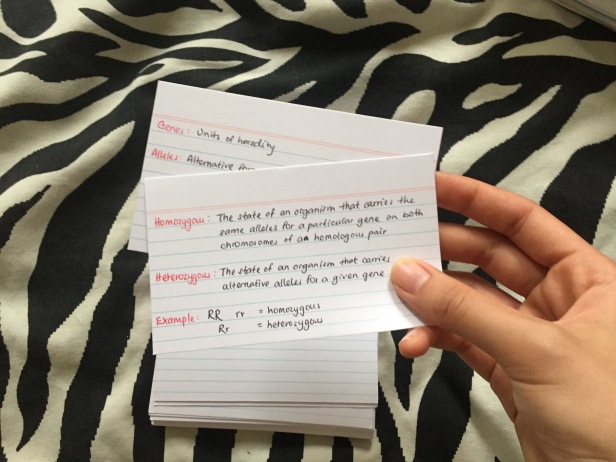 Biology is very definition-based. In the exam, you will need to know nearly-exact definitions. I say “nearly-exact”, because you don’t need to know the definitions word for word, but you do need to use key words.The trick is: Find out what those key words are.
Biology is very definition-based. In the exam, you will need to know nearly-exact definitions. I say “nearly-exact”, because you don’t need to know the definitions word for word, but you do need to use key words.The trick is: Find out what those key words are.
For example, homeostasis: The maintenance of a relatively stable internal environment around certain limits. - Figure out what your strongest learning style is, and follow it:
a) Visual learners:
– Stick concept charts & diagrams on your bedroom walls.

My advice: Avoid using words, unless they’re labels. I can stare at a sentence for goodness-knows-how-long and it won’t make sense to me. But if I stick up a pretty picture, it all suddenly makes sense! Print out heaps of diagrams of signal transduction, protein synthesis, translation, transcription, DNA structures etc and STICK THEM EVERYWHERE.- Find videos with pretty animations, and watch them over and over (even on mute if you’re getting annoyed) until you can draw the diagrams out yourself.Really pretty Biology videos: In A Nutshell, Thought Bubble sections in Crash Course Biology, and any other random ones you can find.
b) Kinesthetic learners:
– Write out notes
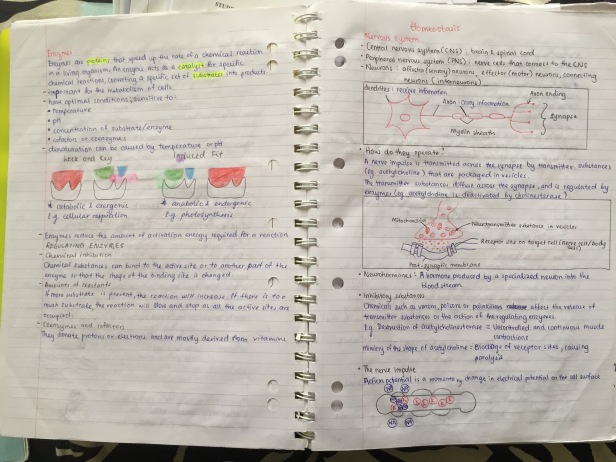
The pure act of writing out the notes was very useful for me in organising and comprehending information. Personally, I didn’t look at them after I was done with them, but the information stuck in my head after I wrote it out for the first time.
– Draw diagramsIn the VCE Biology exam, you will definitely get at least one question that requires you to draw diagrams. If you’ve stared at these diagrams 20 times and you still don’t get it, draw them out yourself in a way you can understand them.
And remember to include labels.
– Make flow charts
All the concepts in Biology link to each other. You learn about the structure of proteins in order to understand enzyme functions. You learn about movement through membranes to understand signal transduction. You learn about genetics to understand evolution.BIG POINT TO REMEMBER: EVERYTHING IS LINKED
c) Auditory leaners:
– Watch Edrolo for really good VCE-centred Biology advice.
This series of videos are made by Andrew Douch, who’s a bit of a goof at times, but overall, he explains things really well. He also knows the updated VCAA study design for Biology, and so only explains the things that you will need in the exam.This is good for the last few weeks before the exam, when you really want to hone in specific knowledge that you need according to the VCAA.
– Watch Crash Course Biology for more in depth knowledge
Hank Green was my bae for the most part of this year. Some things in Biology don’t make sense unless you know the nitty gritty chemistry of how things work, such as photosynthesis and cellular respiration. It’s not necessary according to the VCAA to know the chemical equations in depth, or exactly why carbon is important, but it helped me a lot when I was trying to understand how certain metabolic pathways worked to know the basic chemistry behind it.
– Watch In A Nutshell for information about the Immune System
There is some irrelevant and extra information in this series, but nonetheless, useful to help in your understanding.
– Watch Khan Academy for general information about Biology
For a different perspective on things, it would be helpful to watch these if you have time. Take note: The Khan Academy curriculum is based on the US Education System, and hence it won’t fit exactly into what the VCAA wants you to do in your exam.
– Listen to Douchy’s Biology Podcast
This is, again, made by Andrew Douch, and very useful for long car trips or walks to school.My advice: Use all three learning styles. When I talked to my Biology teacher about this, she told me, “Everyone starts off having a dominant learning style, but the end goal should be to be equally good at all three, because that’s when you’ll learn optimally.”
3. Use your textbook
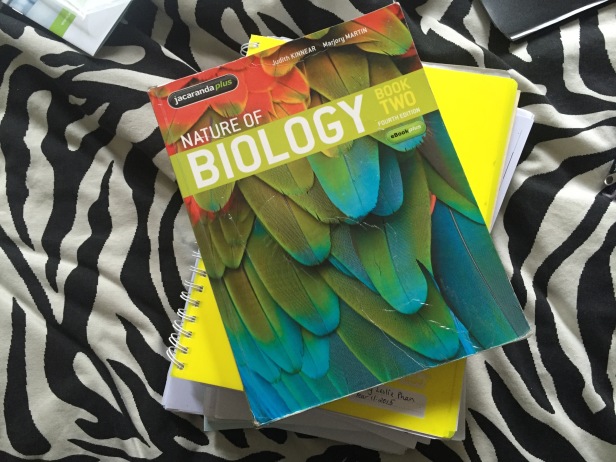
More specifically, use the glossary and diagrams spread throughout the textbook.
Glossary: Use it for definitions. If you’re using Nature of Biology, this is the VCAA approved textbook and they will accept any definition from within the textbook. You can be 100% sure that this is the right definition.
Diagrams: Same goes as above. They also have fairly good ones that worked for me, but if you find any that don’t, feel free to google up more.
DON’T: Don’t read through the textbook as revision. Active revision is always better than passive revision, and unless you have heaps of time and have covered every other revision technique, do not resort to this extremely boring and non-effective method of studying.
4. PRACTICE EXAMS
Imagine me as Shia LaBeouf now: JUST DO PRACTICE EXAMS. DO THEM. RIGHT NOW. DO ALL OF THEM. DO. PRACTICE. EXAMS.
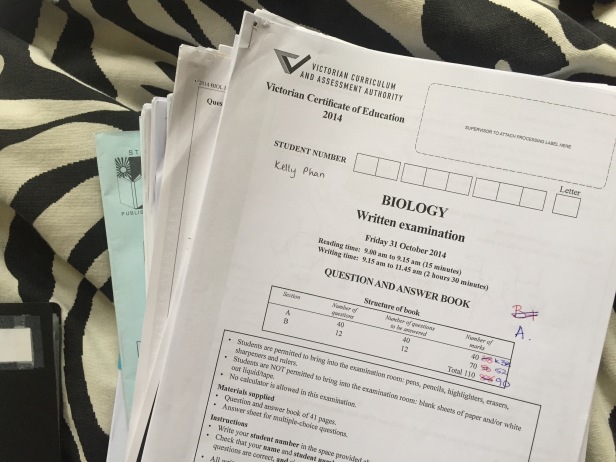
Now that I’ve calmed down, here are the reasons why you should definitely do practice exams, and why you won’t have much hope of achieving anything 40 and above if you don’t:
a) You’ll learn how to word your answers to questions appropriately.
Examiners want straightforward, to-the-point answers. Exams are not the time to waffle about your grandmother’s family tree and how it relates to evolution, especially not in Biology. The only way you will know how to be Goldilocks and judge whether your answer is too little, too much, or just right is to do practice exams over and over again until you get it right.
b) You’ll learn the ratio of hard questions to easy questions.
Granted, it is always possible for your exam to completely sway from previous exams, but the basic structure of it won’t sway by much. You’ll learn how to spot easy questions, how to spot tricky questions, and the amount of time you need to dedicate to them.
c) You’ll learn your own competencies in each area of study.
If you do practice exams under test conditions a few times, you’ll learn what you need to revise more on, because obviously, this will be indicated by the questions you’re struggling with.
d) You’ll find your confidence building
Because you’ll know what to expect and how to deal with the curveballs thrown by the VCAA.
Now, if you’re convinced enough, here’s how to maximise your practice exam experience:
a) For the first few practice exams, don’t do them under exam conditions. These are preferably the most recent exams. Have both the practice exam and the examiner’s report open side by side. Do one question, then check it.
Don’t just check if you’ve got it right or wrong, that’s the basic need for checking answers. What the examiner’s report will also tell you is:
– The percentage of people who got it right/wrong across the state, indicating whether it was tough or easy.
– If it’s a short answer question, what parts of the answer they awarded marks for, and hence what you need to take note of to include next time.
Eg. If the answer asks you to “Explain what is happening in Situation A.”, you will need to both state what is happening and explain why it’s happening.
– If it’s a definition question, what key words the VCAA is looking for.
– If it’s an experiment, the parts of the experiment you have to include.
– If it’s a diagram, how many parts of the diagram need to be labelled and exact diagrams the VCAA is looking for.
– If it’s a multiple choice question, common mistakes students have made in the past when they chose. Then, you need to figure out why they made that mistake and make sure YOU don’t make that mistake.
b) Do practice exams under exam conditions
I recommend doing this after you’re fairly comfortable with doing practice exams in the above method, and once you feel like you need another challenge. If there’s still a long time before your exam and you’ve reached this step, I don’t think you need to do them under strict test conditions. The basic rules for this method are: don’t refer to notes, don’t google, and try out your memory.
In the 2-3 weeks before your exam, then try doing it under test conditions, with the time, uncomfortable chair, limited stationery etc.
c) Make mistakes sheets.
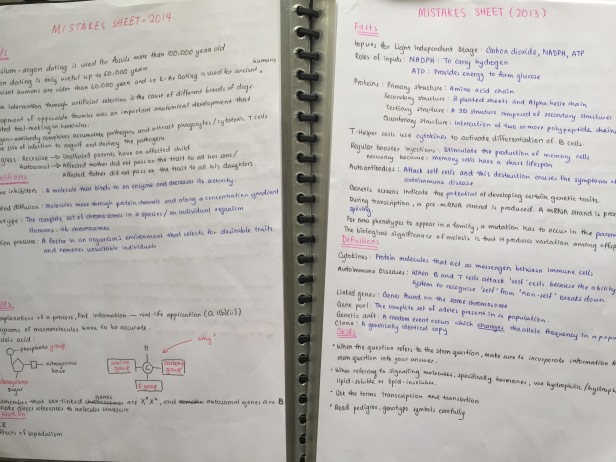
I learned about this technique by reading this interview with a past Biology student who achieved a 50. You need to make one so that you can:
– Remember all of those things in the previous dot points
– Notice your own patterns of mistakes
– Revise factual knowledge that you’re consistently getting wrong so that you can improve. For me, this was about biomacromolecule structures, allopatric speciation and hormones.
How do you make a mistake sheet? For me, I separated a blank A4 sheet of paper into Facts, Definitions and Skills. When I went through the practice exams with the examiners report, every time I found something I was struggling with, or if I wasn’t giving an accurate answer, I’d categorise it into one of those three. When I was doing practice exams under test conditions, I’d highlight questions I was struggling with as I was doing the exam, then made note of them in my mistakes sheet afterwards.
5. Don’t fill up your life with Biology.
If you’re doing other 3/4 subjects, space your revision time out with each one. It’ll help to test your memory if you do one Biology revision session, go do some other subjects, then come back and do a Topic Test to see if your revision worked. If you’re getting sick of doing all of those methods above, don’t give up on them. Instead, take a break and revise by reading about contemporary issues related to Biology such as: Gene therapy issues, our ancestral origins debates, vaccination issues.
Surprisingly, they indirectly help a lot in your understanding of the topic, because you’ll be able to relate it to real life. In exams, they also link questions to contemporary issues, so it’ll help with that too.
This post is mostly about how to study for the subject, and maybe after I receive my results, I’ll share about how I did, and strategies on how to (if my methods worked) get into exam mode and ace your exam!
Love,
Kelly
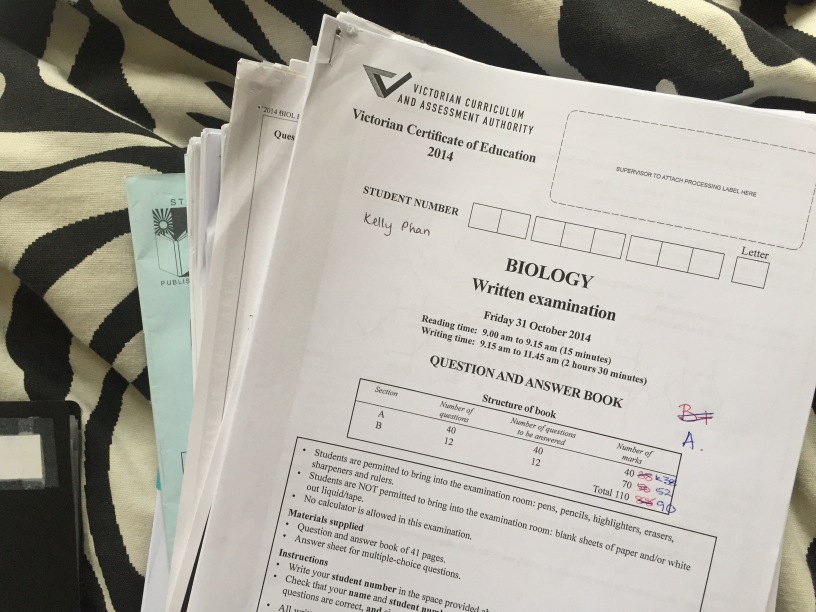
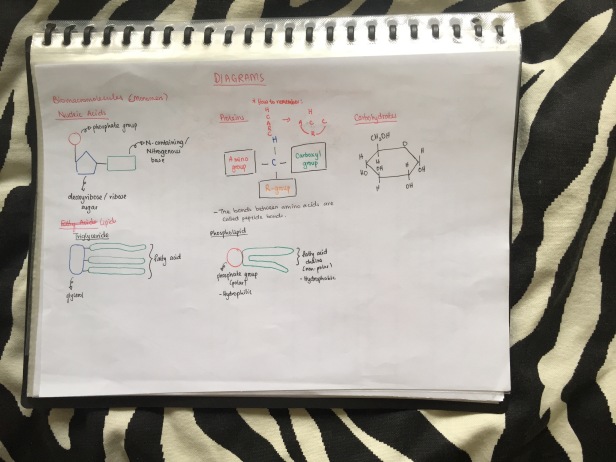
This woke me up 🙂 Thank you so much
LikeLike